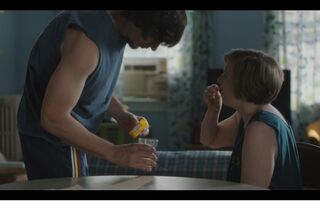OCD
Has "Girls" Cured OCD?
An undemanding narrative beats out an accurate depiction of OCD.
Posted January 22, 2014
“I don’t catalogue my mind. It’s unhealthy.”
- Adam Sackler, who knows what’s up, “Truth or Dare.”

At the end of the second season of HBO’s Girls, we watched in horror as our heroine, Hannah Horvath (portrayed by series creator Lena Dunham), unhinged by her breakup with her “off-the-wagon Neanderthal sex-addict sociopath” boyfriend Adam, succumbed to a nasty combination of counting and sexual-intrusive-thought OCD. Her relapse hit its nadir when she forcefully shoved a q-tip into one ear, and then in a gesture at physical symmetry, a second one into the other.
And, at the climax of last season’s finale, through an admittedly contrived sequence of events, Hannah accidentally reached Adam over her iPhone FaceTime app. Worried for her, he sprinted half-naked across Manhattan, romcom-style, then broke into Hannah’s apartment and scoop her up in his arms like a shirtless knight in shining armor.
It was a sweet moment, although a little forced, and while I had appreciated Dunham’s unflinching depiction of her Obsessive-Compulsive Disorder up to that point, I thought the way she resolved the plotline was a bit corny. So I was curious to see how she’d continue the story of Hannah’s illness with the start of Girls’ third season. Would Adam’s grand gesture prove pointless, and Hannah’s symptoms again escalate? Or would the two of them work together to rebuild their relationship, and stabilize Hannah’s mental health?
As it turns out? Neither! True love doesn’t just alleviate OCD – it obliterates it. Clearly I need to find a girlfriend. Or a boyfriend! Even if he or she is an “off-the-wagon Neanderthal sex-addict sociopath.”
The third season started promisingly. Hannah’s editor – Hedwig of the Angry Inch himself, John Cameron Mitchell – calls her newest draft of her manuscript “amazing” and asks her “why didn’t you tell me you were suffering from mental illness? That’s something we can work with!” Hannah’s response is earnest, and a little vulnerable: “I guess I was embarrassed, to tell the truth.” Mitchell’s character points out that she’s written explicitly about her sex life, and she cracks up as she tells him she now recognizes the inconsistency. It’s a telling exchange, highlighting the tension in our culture between our voyeuristic fascination with mental illness and the shame of disclosing it.
There’s also a bit about her renewed relationship with Adam: he “takes care” of her, and we see a bit of that at the start of the episode, as he pops open her prescription bottle and ensures she takes her morning pills.
And well, that’s pretty much it. A couple of more references to Hannah’s breakdown, always past tense, is as far as it goes. She doesn’t show any more symptoms, even in situations that should be triggering. The language she uses suggests that she considers her obsessive-compulsive outbreak to be in the past.
I’ll admit that bothered me. My first problem was Adam’s knight in shirtless armor routine. Were I in Hannah’s situation, in the middle of a nasty OCD episode, and a loved one in some state of undress sprinted across several zip codes to reassure me, well I’d be impressed. And yes, likely reassured.
But that’s not necessarily a good thing. OCD flourishes in uncertainty; obsession thrives when you have some impossible situation to turn over and over in your head. So when someone tries to “reassure” you, to tell you that things are really okay after all that might quiet you down for a little while. But it doesn’t permanently solve anything. The uncertainty still exists, and though a friend’s reassurance might push it down for a bit, soon enough it’ll stretch and squirm up to subjugate you all over again. No matter how many swarthy shirtless dudes appear to scoop you up and whisper everything’s okay - in the long run, that only makes it worse.
What that suggests is that Hannah’s OCD hasn’t really been properly addressed yet. It means that if the show wants to honor the character’s disorder, then she and her family (and Adam, too, if he’s committed to this relationship) have a lot of work to do.
Girls could go in a couple of directions from there. It could have Hannah and Adam pull together, so she can learn to manage her disorder, and he can figure out how best to support her without reassuring her; or it could illustrate their relationship falling apart under the pressure of her mental illness. Girls is a comedy/drama, and I bet the show could find humor and pathos in either Adam and Hannah pulling together, or in stumbling through a painful breakup.
But season three starts and we get the hot one broke up with the doormat again, this time because the guy playing the doormat was fed up with being a doormat and quit. The Euro one’s in rehab, helping a young African-American woman come to terms with her sexuality, because the show’s been criticized for its lack of diversity and a black lesbian counts as a twofer, right? And Adam’s manic sister shows up, because Girls is an HBO show and there’s no way they’re going to let Game of Thrones surpass them on female nudity. All of this leads to some good jokes, and some tense dramatic moments, and a lot of nudity, and basically a whole lot for fans of Girls to enjoy.
Just not much OCD. And that’s okay, honestly! I think OCD has been criminally misrepresented in popular culture, and I believe Dunham has come closer than anyone to showing the pain and black comedy of long-term OCD treatment. I maintain my conviction that there’s an excellent dramedy to be written that captures the absurdity and pathos of life with this maddening disorder.
It sure wasn’t Monk. And sadly, now I’m not sure it’s going to be Girls, either.
(Also: Adam is totally right, the fork is unquestionably the best utensil, you can scoop AND stab stuff with it. How obvious is that?)
You may also be interested in my columns: “Girls” Gets OCD and Why “Monk” Stunk
Copyright, Fletcher Wortmann, 2014.
Author of Triggered: A Memoir of Obsessive-Compulsive Disorder (St. Martin’s Press), named one of Booklist’s “Top 10 Science & Health Books of 2012.”
Read my Psychology Today blog: Triggered
Image: Copyright, HBO Girls, Episode 1, 2014.




